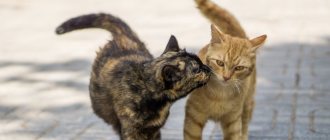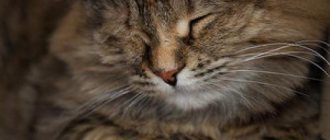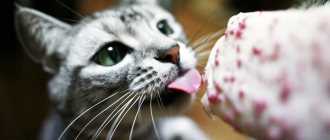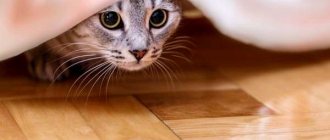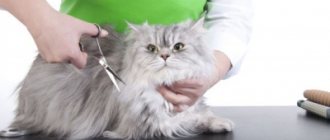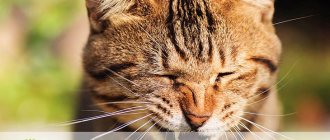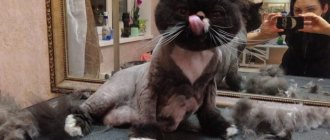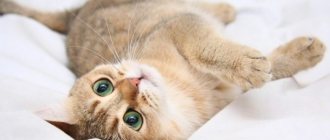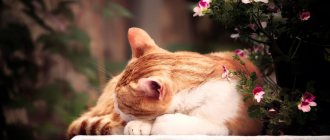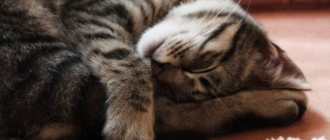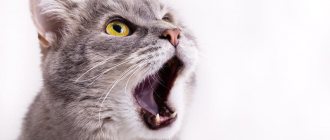Why does a cat meow and scream at night for no reason?
Many pet owners are interested in the question of why a cat meows at night, thereby disturbing the proper rest and sound sleep of other household members. There can be many reasons for this, from a hormonal surge, which sooner or later happens in unspayed cats and unsterilized cats, to melancholy and poor health. This behavior of a pet can and should be dealt with, but to do this, the cause that provoked it must first be eliminated. Under no circumstances should you punish a cat for screaming and meowing at night - this will only make the problem worse. Perhaps the animal needs to be shown to a veterinarian and resort to the use of sedatives. Remember, a cat is a full-fledged member of the family and must be treated properly. Why a cat screams at night needs to be sorted out immediately; the sooner you find the reason for this behavior, the sooner peace and quiet will be established in your home.
What else you need to know about the causes of voice loss in cats
It's good if you know the cause of the disease. After the operation under anesthesia, you were warned about possible silence until the animal fully recovered. You should protect your cat from hypothermia and follow all recommendations.
It’s good if the pet’s silence is short-term and the voice is restored on its own. But you should always be attentive to the accompanying symptoms. Strange behavior, fear of familiar objects, people, drooling, changes in appearance, fear of bright light and water, refusal to eat indicate a fatal disease - rabies in cats. There is no need to experiment or invent a treatment. The infection could have occurred a long time ago, and all this time the family and the owner himself were in danger and were close to the dying infected cat. Contact your doctor immediately.
Spayed cat or neutered cat
Experience shows that a sterilized cat screams in the apartment at night from lack of attention. In this way, she requires the owner's love, so before you decide to have a pet, weigh the pros and cons again. A cat, even a sterilized one, needs a lot of time. It is not enough to just feed her and sometimes pet her - you need to play with her, communicate with her, pet her, and entertain her. Nature has arranged it in such a way that both animals and humans experience acute melancholy from loneliness and lack of love at night or at dawn.
As for castrated cats, they most often scream in the apartment at night for completely different reasons - they may not only be lonely, but also scared. Your pet can experience anxiety for any reason. In order for him to stop meowing and screaming, it is usually enough to pet him. In addition, cats behave restlessly during weather changes. Their behavior can indicate heavy rain, snowfall, hurricane winds and even an earthquake. Never ignore seemingly unreasonable anxiety in your pets.
Causes of night meowing
If you start to figure out why a cat meows at night for no reason, it becomes clear that she still has a reason to do this. It could be:
Quite often, old cats and cats that are more than 10-15 years old begin to meow at night. It's hard to believe, but it turns out that elderly pets, just like people, can suffer from Alzheimer's disease, which manifests itself in increased restlessness at night. Unfortunately, it is impossible to cure this disease, but you need to try to smooth out its manifestations as much as possible, providing your old and sick pet with maximum attention during the day.
What to do and how to calm an animal meowing at night?
Above, we figured out why a cat yells for no reason at night, and now let’s talk about how to calm an agitated animal. Experienced breeders recommend:
If, despite the measures taken, the cat still continues to scream at night, then it’s time to show him to the veterinarian. A professional examination will let you know if your pet needs treatment or if it needs to be wormed to stop the nightly concerts.
Diagnostics
There is considerable controversy regarding the appropriate way to diagnose LPR.
Most patients are diagnosed clinically, based on symptoms associated with LPR.
During laryngoscopy (examination of the larynx), swelling and hyperemia (redness) of varying degrees are noted. However, the relatively weak correlation between symptoms and endoscopic findings argues against the use of endoscopic diagnostic methods.
The Reflux Symptom Score and Reflux Symptom Index are well suited for both diagnosis and monitoring response to therapy.
Daily Ph-metry with a dual sensor probe, despite its excellent sensitivity and specificity, is questioned, since the results of this diagnostic method often do not correlate with the severity of symptoms.
Another diagnostic option may be empirical PPI therapy.
What not to do?
A cat regularly yelling and meowing at night can infuriate even a calm, balanced and patient owner, but no matter how much you want to pick up a broom and teach your pet a lesson, stop - violent measures will only aggravate the existing problem, the animal will be offended and begin to take revenge . An angry cat is capable of a lot - the following can join the night concerts:
If a completely healthy animal continues to wake up your family at night with its meows, use sedatives that can be bought at a veterinary pharmacy, but do not abuse them.
It can be quite difficult for a person and a cat to get along in the same territory, but if you decide to adopt a furry pet into your family, then be prepared for the fact that it will bring you a lot of trouble. Night concerts are extremely rarely organized by healthy and happy animals. Find out the reason for the cat's unusual behavior at night!
Source
Treatment
The method of treating an animal should only be prescribed by a veterinarian after a diagnostic examination. Based on its results, various therapeutic measures can be prescribed, for example:
Self-medication is strictly prohibited. Such a reckless act can lead to a deterioration in the animal’s well-being and even suffocation.
The cat snores and groans
Pet Club forums > Talk about animals > Cats, cats, kittens... > British: breathing problems
View full version : British woman: breathing problems
Dear, who knows, tell me? I have a cat - 4 months old, British kitten. She has breathing problems: she constantly sniffles, and even snores at night, so much so that sometimes my wife and I wake up and it’s often hard to breathe. And recently they discovered that she had something sticking out in her abdomen - closer to her front paws, in her chest, even almost between her paws - either a bone or cartilage. when you press it, it goes away, but then it appears again.
In fact, it's normal for Brits to grunt, snore and snore. it all depends on the sounds, if it is obvious strained breathing, then go to the veterinarian for an x-ray, and as soon as possible, there may be a problem with the lungs. and “cartilage” looks like a hernia. in any case, go to the doctor, maybe the hernia can be repaired, if not, surgery
I have a similar problem, by the way, sometimes a little sphinx sniffles in its sleep... sometimes it starts to exhale loudly, but that’s only if it runs up too much, and only for a couple of seconds... by the way, something is also sticking out in the same area...
We definitely don’t have a hernia, I see a mark from the umbilical cord on the skin, and this thing is right next to the paws, between the ribs... we assume it’s false cartilage, but we’ll see a doctor soon.
Lola, I read about your problem with the Sphinx, I really sympathize with you, your cat is lucky to have you. Olya has already advised everything that is possible, as it seems to me... and about sphinxes - I’m not sure that they snore, their muzzle structure is not at all the same as that of razors, they make such sounds due to their slightly “flattened” nose, The sphinx should not, in theory...
The cat groans
I took my cat to the veterinary clinic because he sometimes falls to the floor and starts coughing/groaning/moaning, this lasts from a few seconds to a minute. At the clinic they looked at him and turned me around: your cat, they say, looks completely healthy, but we don’t know anything about how he groans there until you record a visual video for us.
1. Cat, almost 3 years old, British mixed breed. 2. Perfect fit dry food (but these attacks began long before this food, and they tried a variety of foods during his life). 3. Vaccinated in 2015 against rabies and other diseases, valid until 2017-18. 4. The attacks began a very long time ago, unfortunately, no one remembers exactly. More than a year ago. 5. Symptoms: the cat eats, goes to the litter box, shiny fur, clear eyes, everything is fine, but sometimes (completely by chance, at any time of the day, sometimes every next day, sometimes once every few weeks) he finds something on him, he begins to make whining sounds, as if he is suffering from something, he lies down on the floor, stretches his head horizontally to the floor and moans like this for a short time. a) appetite is normal, depends on food. He can eat a lot of treats like meat, but eats little of his usual dry food. We don't feed him enough. b) He also drinks a little water. b) runs around the apartment, in good shape. c) urinates in the tray, it has wood filler, so I won’t describe the parameters of the urine. d) the stool is normal if you do not feed. Fertilizing causes diarrhea, which is why we don’t give it. e) he doesn’t vomit if nothing extra/unusual is given.
Treatment at the veterinary clinic
If you are unlucky enough to encounter a similar problem, be prepared for a full examination of your pet. The veterinarian analyzes the condition of the throat and nasopharynx and, if necessary, prescribes x-rays and blood tests. Some examinations involve putting the cat into medicated sleep.
When the cause of the disease becomes clear, treatment is prescribed. For each individual case there are different prescriptions: pills, injections, ear swabs, droppers, various kinds of diets and even operations. It all depends on the severity of the case.
For example, in case of obesity, it is enough to switch the cat to specialized food. With hyperplasia of the soft palate, the owner should put up with snoring. Surgery is performed only in cases where there is an immediate risk to the health or life of the cat. Parasitic infestation is treated by taking special tablets.
ATTENTION! To prevent parasites from appearing in your cat’s body, give him preventive tablets. Cats with asthma are given steroids based on how advanced the disease is.
Cats with asthma are given steroids based on how advanced the disease is.
A healthy animal is the key to family peace. Remember that physiological snoring cannot be cured. But if you see something big in him, don't delay going to the veterinary clinic.
Treatment of laryngopharyngeal reflux
Lifestyle changes and diet are the main approach in the treatment of LPR and GERD. The role of drug therapy is more controversial. It is unknown whether asymptomatic patients with incidentally detected signs of LPR require treatment. There are theoretical concerns that LPR may increase the risk of malignancy, but this has not yet been proven. In any case, patients with asymptomatic LPR are advised to follow a diet.
Patients are advised to quit smoking, alcohol, and avoid foods and drinks containing caffeine, chocolate, and mint. Prohibited foods also include most fruits (especially citrus fruits), tomatoes, jams and jellies, barbecue sauces and most salad dressings, and spicy foods. Small meals are recommended.
You should avoid exercise for at least two hours after eating, and refrain from eating or drinking three hours before bedtime.
Drug therapy usually includes proton pump inhibitors (PPIs), H2 blockers, and antacids. A PPI is recommended for six months for most patients with LPR. This figure is based on the results of endoscopic studies (this is the time needed to reduce laryngeal edema), as well as the high percentage of relapse in the case of a three-month course of therapy. Discontinuation of therapy should be carried out gradually.
If therapy with PPIs and H2 blockers is unsuccessful, treatment with tricyclic antidepressants, gabapentin and pregabalin should be considered, since one of the possible mechanisms for the development of reflux is increased sensitivity of the larynx.
Why is the cat snoring?
The respiratory system of cats is similar to humans. Our pets can sigh, sniffle and even snore in the same way. Most often this happens in a dream. Dreams of cats can consist of various events that cause an external reaction not only in the form of twitching their paws, as if the animal is running, shuddering, but also reactions of the respiratory system.
But if a cat or kitten sniffles not only during sleep, but also when awake, this may indicate the appearance of health problems. In this case, the owners need to more carefully observe the pet, which sniffles when it breathes, and track the duration and frequency of the snoring. This can help in determining the cause of the condition, and in deciding what to do and how to treat the animal.
The most common causes of cat snoring
:
Periodic snoring is normal for humans and animals. If this happens rarely, it should not be a cause for concern. But if it's a cat sniffling while breathing all the time, or even breathing with its mouth open, it should be a cause for concern. Persistent breathing problems can lead to more serious health problems. Most likely, you will need a veterinarian's consultation and treatment, because... It is difficult or even impossible to independently determine the disease. But before contacting a doctor, it is necessary to observe an animal that is sniffling and breathing heavily. To make a diagnosis, exclude various diseases and prescribe the correct treatment, the doctor will need detailed information.
The veterinarian may ask for the following information about a cat who wheezes when he breathes:
:
If your cat is breathing poorly through his nose and sniffling, you should not wait for this to go away on its own. Such signs may indicate a serious illness in a cat or kitten that requires immediate treatment.
The nature of the snoring and sounds can often roughly determine the source of the disease.
:
Only timely initiation of treatment and the correct choice of medications can ensure a quick and complete recovery of the pet. You should not rely on the recommendations of other cat owners from forums - each case is individual, even with similar symptoms.
Cat lovers take care of their pets like children. The slightest deviation in animal behavior or oddities causes anxiety for cat lovers. One of them is cat snoring. Cats snore for various reasons. Let's look at them in more detail.
Snoring among people and even among dogs is a normal, common occurrence. Cats snore much less often in their sleep, but it does happen. This most often occurs with breeds with a flattened muzzle.
Such animals have short sinuses in the nose, which leads to a “source of noise” during sleep.
This phenomenon is commonly called brachycephalic syndrome.
Snoring breeds include:
Just because your pet has a flattened face does not mean that he cannot get sick. Observe the animal and if you think the temple is abnormal, consult your veterinarian immediately.
Brachycephalic syndrome can manifest itself in three types. Owners of brachycephalic breeds should be well versed in their characteristics.
One of the most common symptoms is a stenotic nose.
It is represented by small nostrils through which air flows at a lower speed. Such cats should not lead an overly active lifestyle and should not be exposed to stress that can cause shortness of breath or heart failure.
Another irregular structure of the muzzle is an elongated soft palate.
. The cat's palate sags down and prevents air from passing through.
Cases of tracheal stenosis are not uncommon.
This means that the tracheas of breeds at risk are narrowed in places. This structure makes them vulnerable and is a pathology.
Cats of other breeds may also snore and wheeze in their sleep. If this process is accompanied by grunting, tail wagging and limb twitching, this is normal.
Types of wheezing
Wheezing is a combination of sounds and noises. Each disease has its own variants. Wheezing can be :
- with a whistle;
- wet;
- crepitant;
- dry.
© shutterstock
If moist wheezing is heard, the cat is suffering from mucus accumulated in the bronchi. Sputum is formed in large quantities against the background of inflammation and colds that affect the broncho-tree. The inhaled air seeps through the mucus in the form of bubbles, which then burst. As a result, the cat wheezes when he breathes. This combination of sounds refers to the wet version. In this case, wheezing has several varieties :
- Fine bubbles, when small balloons formed by phlegm collapse. They appear with bronchitis, pneumonia and pulmonary infarction.
- Medium bubbly - like the sound of air being blown through a straw. Such wheezing appears during bronchitis, accompanied by excessive mucus production, pneumosclerosis, or pulmonary fibrotic changes.
- Large bubbles can be heard without a medical device. Wheezing appears due to the accumulation of exudate in the lungs. This occurs due to swelling of the organ or with a weak cough.
Dry, heavy breathing with wheezing may be the result of obstruction due to narrowing of the bronchi. Also, the reason may be an allergic reaction or compression of the airways by a neoplasm. It is difficult for air to penetrate through narrow gaps, which creates a certain noise. Then it develops into a wheezing wheeze as it moves along the unevenly narrowed bronchi.
If they also contain viscous mucus, then membranes are created that block the path of air. As a result, breathing takes on a buzzing sound. It is very difficult for air to penetrate through the narrowed and partially covered lumen.
Why do kittens twitch in their sleep?
Answer to the first question
: Not only kittens twitch in their sleep, but all animals, including humans. The brain is to blame again! Physical activity forces the muscles to remain in constant tone, and when falling asleep, the brain sends a short-term impulse: “Relax urgently!” - and the muscle twitches so that we can begin sleepy relaxation. The same thing happens in kittens: an impulse - the kitten twitched, as if from an electric shock. But this is an absolutely painless phenomenon! Scientifically, it is myoclonus.
Answer to the second question:
Cats' front teeth are shorter than their canines. When the jaws close during sleep, a rather impressive gap remains between the incisors, where the “lost control” tongue ends up. Well, it fell out and fell out - there’s nothing wrong with that!
Why does a cat snore in its sleep and what does it mean?
When a cat snores loudly, many stress-resistant owners do not pay attention to it; people with light sleepers simply send their pet to sleep in another room. But, as a rule, no one thinks about the fact that an animal’s “loud” sleep may indicate illness.
About cat snoring
You should treat snoring normally if you have a representative of any brachycephalic breed - such animals have a short and often flattened nose. For example, many Persians sleep quite loudly from childhood.
Cats, like people, also sometimes dream. They are usually very rich and bright. In his dreams the pet:
At such moments the beast strongly:
What to do if your cat sniffles a lot?
Many owners become very worried when they notice that their cat is sniffling loudly and behaving strangely. The first thing that comes to mind is, of course, viral respiratory diseases, in which the nose becomes stuffy, the body temperature rises, and the eyes become red and watery.
In severe forms, rashes in the form of pimples or pustules may be present on the body. But snoring is not always associated with viral pathologies. Its appearance can also be provoked by narrowing of the nasal passages and the appearance of growths and tumors in the nasopharynx.
Possible causes and most common diseases
You need to understand that in some breeds (brachycephalics), sniffing during sleep is considered absolutely normal due to the structural features of the muzzle. The only thing is that it is more difficult for them to recognize the symptoms of respiratory pathologies in time.
In all other cats, such symptoms can be caused by the following reasons.
Foreign body
It's not often that something gets into a cat's nose, but even a small piece of fabric or thick paper can cause snoring and whistling when breathing. Almost always, owners manage to remove the source of irritation on their own. In rare cases (splinters, plant thorns), the participation of a surgeon is required.
Allergy
It has a huge number of varieties, but we are interested in contact dermatitis, which is characterized by the appearance of crusts in the nose that can cause wheezing when breathing.
Food allergies usually include watery eyes, sneezing, swelling of the face, and various types of rashes. Contact dermatitis is characterized by nasal congestion and discharge, sneezing and itching.
This reaction can be triggered by home flowers, household chemicals, or pollen from flowering plants (in pets with access to the street). Unfortunately, allergies are very difficult to diagnose and even more difficult to treat, so very often you have to resort to the method of eliminating potential allergens.
In some cases, the reason may even lie in the tray filler, after replacing which all symptoms gradually fade away. It is also recommended to limit animals’ access to household chemicals and detergents.
Growths
The most common formations found in the nose of cats are polyps. Their danger lies in the fact that they can cause overgrowth of the nasal passages, which will inevitably affect the general condition of the pet.
At first, you may notice a slight sniffling through your nose during sleep or at rest. In the future, nasal discharge and an unpleasant odor may appear. The diagnosis can be confirmed using x-rays and rhinoscopy.
In severe cases, an MRI of the entire head may be needed. The need for removal is determined only by the surgeon. Ideally, polyps of any size should be removed and sent for histological examination.
Tumors
Most often malignant. Occurs in adults after 10 years. They are usually detected in the later stages, since the symptoms are very similar to many viral infections. At the initial stage, you may notice that the cat is sniffling through its nose. Subsequently, discharge and a foul odor appear.
In severe cases, serious breathing problems begin, the nose bleeds, and the general condition rapidly deteriorates. With tumors everything is much more complicated (unlike polyps). For diagnosis, it is necessary to do a rhinoscopy, biopsy, MRI and CT scan of the head. X-rays are also indicated to exclude metastasis.
Removal is only surgical with the capture of healthy tissue. In most cases, the prognosis is poor due to late detection and the age of the animal.
Cat flu
Recently, it has become increasingly common even in young, vaccinated individuals. You can become infected from a sick cat or other animal carrier. The danger is that the mortality statistics are very high. But this is in the absence of treatment.
At the initial stage, the disease affects the nasopharynx, which affects breathing - wheezing, whistling and gurgling appear. As the process progresses, pus begins to discharge from the nose.
In advanced cases, the body temperature rises and the lungs are involved in the process. Treatment is strictly individual with the use of potent antibiotics
Much attention is paid to prevention, which includes disinfection of housing and all objects with which the sick animal has been in contact.
Deviated nasal septum
May be a birth defect or due to illness or injury. A deviated nasal septum occurs in cats of all breeds, regardless of the type of muzzle. The condition may not affect the quality of breathing, while increasing the “musicality” of the pet and causing it to:
Sounds that are loud enough are sometimes the only problem. If your cat grunts when breathing, but there are no other disturbances or discomfort, there is no need to worry about the nasal septum. But it is better to regularly show your pet to the doctor - the usual sounds may have a new reason, such as a runny nose or pneumonia.
Neoplasms
Heavy breathing in a cat can be caused by polyps. Most often, such neoplasms appear in animals under 2 years of age. But cases of the formation of polyps in older individuals have been recorded. Veterinarians have differing opinions about the cause of their appearance. According to different versions, nasal polyps are formed due to:
long-term or chronic inflammation of various natures.
The formations impair the sense of smell, creating the likelihood of decreased interest in food. If polyps are present, the cat sniffles through its nose when breathing; Snoring and shortness of breath appear after physical activity. Treatment consists of surgical removal of part of the tumors, since it is difficult to completely remove the grown masses. The bases of the polyps remain. Doctors do not cut them out to avoid damaging the nerves and airways. As a result, there is a possibility of relapse.
The fact that the cat wheezes when breathing may be the reason for the return of polyps. Veterinarians will prescribe corticosteroids and anti-inflammatory drugs to slow the growth of the growths, but further surgery will sooner or later be required.
Polyps are benign formations that are not prone to degeneration into cancer. But difficulty breathing in a cat can also be caused by oncology. Nasal adenocarcinoma is a slowly developing disease that most often affects males and large breeds.
The exact cause of the tumors is unknown, but scientists have noticed a connection between their formation and high levels of pollution in the pet's environment.
Various methods are used to detect cancer. The veterinarian can insert a miniature camera into the animal’s nasal cavity (it is also possible to identify polyps), and take tissue from the respiratory tract or lymph nodes for a biopsy.
Analysis of the latter is carried out when searching for metastases. The effectiveness of treatment of the disease depends on the speed of diagnosis. It is best to combine surgery to remove the tumor with radiation therapy.
Infections
Pathogens in the nasopharynx often cause shortness of breath in a cat. Inflammation, accompanied by sneezing, wheezing, weakness and other changes, is provoked by all types of harmful organisms:
viruses (for example, feline herpesvirus);
Kittens suffer from pathogen attacks more often than adults due to their less developed immunity. A weakened body can also cause infection in an elderly or sick animal. Considering that wheezing in a cat when breathing and other symptoms associated with the respiratory system have various causes, treatment should be prescribed only after a diagnosis has been made.
A blood test and other biological fluids, an examination and a study of the animal’s medical history help determine the pathogen. The owner should not self-medicate. Antibiotics chosen to fight the virus will not help the animal, creating additional stress on the body and contributing to the development of drug-resistant microorganisms.
Disruption of other systems
The fact that a cat wheezes, coughs, sniffles or sticks out his tongue when he breathes does not always indicate problems with the respiratory system. Thus, changes can be caused by inflammation of the dental nerves. In cats, like in people, this condition is accompanied by a runny nose. Animals are also susceptible to heart cough.
Disruption of the circulatory system affects the lungs. They can also be compressed by the enlarged heart muscle, causing coughing or situations where the cat breathes like a dog, sticking out its tongue. The presence of symptoms indicates that the disease has passed the initial stages.
Treatment depends on the disorder. But in all cases, medications are prescribed that support the cardiac, respiratory and immune systems. Excess weight also causes breathing problems. A fat cat breathes with his mouth open even after minimal physical exertion.
Foreign bodies
Various foreign objects can get into your cat's mouth and throat. Some come from food (for example, fish bones), others are eaten out of curiosity or during play. The main sign of a foreign body is choking. A stuck object also causes the cat to breathe heavily with its mouth open.
Comprehensive diagnostics
Cat owners should remember that any pathology has several manifestations at once, which make it possible to more accurately determine the disease. If you don't notice any changes in your pet other than snoring, there is most likely no cause for concern. Of course, an extra trip to the vet is never harmful.
If you have any doubts about your cat's health, take it to the veterinarian, describing in detail your pet's snoring.
However, cats whose snoring is accompanied by other negative symptoms that are not immediately noticeable and sometimes almost completely unnoticeable deserve special attention. Less obvious manifestations of a possible disease include:
When diagnosing the disease, you should pay attention to the painful manifestations that accompany snoring.
Taking an anamnesis
If you have checked one or more items from the above list, you should collect a preliminary medical history to prepare for the veterinarian’s upcoming questions. The anamnesis includes the following information:
A comprehensive history will help the veterinarian quickly understand the pet’s condition.
Foreign object
When a cat coughs as if it was choking, instead of panicking, it is advised to determine the time and duration of the reflex and assess the pet’s condition. Sometimes an animal greedily gobbles up the food it likes, and food particles stick to the roof of the mouth. To get rid of the problem, the cat sticks out its tongue, coughs up small particles of food that come out along with the vomit, and stops stretching its neck.
The owner should be wary when the animal tries to open its mouth wide and rubs it with its paw, since the reason why the cat coughs, as if choking, is:
- blade of grass or sliver;
- filler or bead;
- a piece of rope;
- toy part;
- bone from fish, chicken.
An animal that makes hoarse sounds without belching should be picked up, and the mouth should be inspected by opening its mouth. If the cat owner cannot remove the object on his own, he should contact a veterinarian.
Causes of snoring in brachycephalic cats
Since this phenomenon is well-known, veterinarians have already accumulated statistics on the most common pathologies.
Nostril stenosis in brachycephalic cats
In Russian-language veterinary literature, this phenomenon is almost not considered, but practicing specialists are confident that its importance is clearly underestimated. In this case, stenosis implies thickening of the tissues lining the inside of the nasal cavity.
The causes of stenosis vary, with many experts suggesting that brachycephalics have a genetic predisposition. Chronic inflammatory diseases of the respiratory system, the effects of irritating and toxic substances, allergies, etc. play a major role.
In severe cases, stenosis leads not only to relatively harmless snoring, but also to serious respiratory failure. This, in turn, is fraught with deterioration in oxygenation of tissues throughout the body, which will inevitably lead to the development of other pathologies.
Lengthening the soft palate
Another pathology characteristic of cats with a flattened muzzle. The supposed reason for the development is the genetic predisposition of the breeds described above. As the name suggests, in this case the tissues of the soft palate lengthen and sag, blocking the respiratory lumen.
During wakefulness, when tissue tone is relatively high, no symptoms may appear. But during sleep, when the pet’s body is completely relaxed, the soft palate sags greatly and “falls” into the lumen of the respiratory organs. This causes snoring and severe breathing problems. Sick cats sleep poorly, wake up abruptly, and this process is accompanied by wheezing, loud meowing and other “special effects.”
Internal laryngocele
A pathology characteristic only of Persian and Himalayan cats. It is extremely rare in representatives of other breeds. With this disease, swelling and growth of false vocal folds are noted.
One of the characteristic signs is the same snoring. Also, sick cats are distinguished by a strange hoarse meow, and during “conversations” the pets often cough and wheeze. In extremely rare cases, laryngoceles can grow through the soft tissues of the neck (i.e., external laryngoceles appear). In this case, they are easily distinguishable as swelling under the skin.
Symptoms of laryngopharyngeal reflux
- Dysphonia or hoarseness;
- cough;
- feeling of a lump in the throat;
- discomfort and feeling of mucus in the throat;
- dysphagia (impaired swallowing).
Some researchers believe that chronic irritation of the larynx may lead to the development of carcinoma in patients who do not drink alcohol or smoke, although there is no data to support this.
Symptoms characteristic of LPR may also be caused by the following conditions:
- postnasal drip;
- allergic rhinitis;
- vasomotor rhinitis;
- upper respiratory tract infections;
- habitual coughing;
- use of tobacco or alcohol;
- excessive use of voice;
- changes in temperature or climate;
- emotional problems;
- environmental irritants;
- vagal neuropathy.
Snoring and wheezing in brachycephalic cats
Brachycephalic cats are cats whose head width reaches up to 75% of its length. Such animals have a shortened skull and a flattened muzzle. Brachycephalic breeds include Scottish, British, Persian, Himalayan and exotic breeds. Such cats have certain features in the structure of the muzzle and larynx that interfere with the passage of air through the nasopharynx. This makes it difficult to breathe, causing wheezing and loud snoring, which are considered normal for brachycephalic breeds.
Features of the anatomy of brachycephalic cats:
Due to such structural features, cats of brachycephalic breeds almost always sniffle and grunt in their sleep from an early age. Don't worry if your cat has been breathing like this since childhood. The alarm should only be sounded when snoring at night develops into suffocation. Brachycephals are more likely than other breeds to suffer from respiratory diseases, so a sharp change in the timbre of snoring is a reason to contact a veterinarian.
Why does a cat sniffle and grunt when breathing: health hazards and ways to solve the problem
Cats are capable of making a wide range of sounds: purring, growling, howling, whining. But such performances are usually a reaction to external or internal stimuli. In a calm state and in sleep, the animal behaves quietly. If the owner begins to notice that the cat is wheezing, grunting or making other unusual sounds when breathing, it is worth taking it to the veterinarian. You should not postpone a visit to the doctor if there are changes in behavior.
Heavy, rapid breathing, protruding tongue, constantly slightly open mouth are possible symptoms of disorders of varying severity. Here are the main reasons for changes in the functioning of the respiratory system.
Eating and snoring. Is there anything in common between them?
Diet is directly linked to snoring
Obesity is one of the causes of snoring, so this point needs special attention. If the cat is overweight, it is very difficult for him to breathe, so he begins to snore
If you have learned that nutrition is the main method of treating snoring, then consider a few points.
It is important not to put your pet on a strict diet, as this can harm its health. Reduce food portions gradually so that the cat’s body is not in shock
Let's give our cat healthy and varied food. After a while, the cat will acquire a normal shape and the snoring will disappear on its own.
I have been a veterinarian for a long time, unfortunately, many do not understand that snoring is a serious problem in cats that leads to complications. If you start treating the cause of snoring in time, then your pet will not experience the side effects of snoring. A common cause of sniffling is excess weight, so, dear owners, do not overfeed your cat, but make sure that he eats healthy food in a balanced amount.
Many owners do not know that cats have no sense of proportion and if you give them a lot of food, they will immediately eat it. Give your pet small portions of food to prevent him from gaining excess weight. Do not forget that nutrition greatly affects the health of animals, so you should not feed your pet just anything.
The first thing to do when your cat sniffles is to see a specialist. Timely treatment will protect your pet from bad consequences. Do not treat your cat without knowing the cause of its snoring.
If your cat is overweight, then get her to exercise. Awaken her hunting instinct so that she moves a lot. Buy her toys or let her out into the fresh air to hunt.
Sometimes surgery may be necessary to remove foreign bodies that are preventing your cat from breathing normally. If this is not done on time, then due to a lack of oxygen, malfunctions will begin to occur in the cat’s body.
It is impossible to say unequivocally how to treat snoring in cats, since this is due to the individual characteristics of the pet, the causes of snoring and many other factors.
Laryngopharyngeal reflux
Laryngopharyngeal reflux (LPR) is the reflux of gastric contents (acid and enzymes such as pepsin) into the larynx, leading to hoarseness, a feeling of a lump in the throat, difficulty swallowing, coughing, and a feeling of mucus in the laryngopharynx.
Reflux as a cause of the above symptoms without gastroesophageal reflux disease (GERD) is constantly being questioned. Guidelines issued by specialist societies in the field of laryngology and gastroenterology present different points of view. Both groups acknowledge that interpretation of existing studies is complicated by vague diagnostic criteria for LPR, variable treatment response rates, and large placebo effects in treatments.
There are relatively limited data on the prevalence of LPR: approximately 30% of healthy people may have episodes of reflux on 24-hour pH measurements or show characteristic changes in the larynx.
LPR can directly or indirectly cause laryngeal symptoms. The direct mechanism involves irritation of the mucous membrane of the larynx with caustic substances - refluxates (acid, pepsin). The indirect mechanism involves irritation of the esophagus, leading to laryngeal reflexes and symptoms.
Helicobacter pylori infection may also contribute. The prevalence of H. pylori among patients with LPR is about 44%.
About cat snoring
You should treat snoring normally if you have a representative of any brachycephalic breed - such animals have a short and often flattened nose. For example, many Persians sleep quite loudly from childhood.
Cats, like people, also sometimes dream. They are usually very rich and bright. In his dreams the pet:
At such moments the beast strongly:
This is usually accompanied by clenching the fingers, extending the claws, wagging the tail, etc. It is not difficult to stop this - just change the cat’s position. As a rule, such situations do not occur too often and do not pose a health hazard. The only thing that can make you worry is frequent dreams. They often indicate that your pet is stressed.
However, you need to be wary when your pet, in the previous years of its life, rested quietly, then suddenly begins to make characteristic sounds during sleep.
Cat sounds are more varied than they seem.
Everyone knows that cats purr and meow. We learn about this in early childhood. However, the auditory signals given by a cat are much more varied and complex. The cat growls, grunts, snorts, hisses, howls.
Even a simple meow takes different forms depending on the emotions that the animal is experiencing at the moment. However, you should not think that the sounds of cats are only a reflection of the mood of our pets. They perform another important function: they serve for communication. So if you know their meaning, talking to your cat will be much easier.
Photo: Pixabay
Causes of snoring
There are several factors that cause sleep problems in cats. This is a genetic predisposition and physiological deviations in the health of the animal. For some cat breeds, snoring is considered normal. This is due to the fact that the sinuses of these cats are too short. This phenomenon is called brachycephalic syndrome. Persians, British, Scottish and exotic cats are susceptible to it. The shape of the skull in these breeds is completely round, and the muzzle is flattened and short.
If your Scottish or British cat begins to snore heavily, breathe heavily and suffocate, you should consult a veterinarian as soon as possible. Most often, in such cases, surgical intervention is resorted to. Sometimes a sleeping cat makes sounds that have not been observed before
It is important for the owner to monitor the pet and visit the clinic in the following situations:
When adding sneezing to a symptom, you should not ignore the animal’s condition.
The causes of snoring and such sounds may be the following pathologies:
